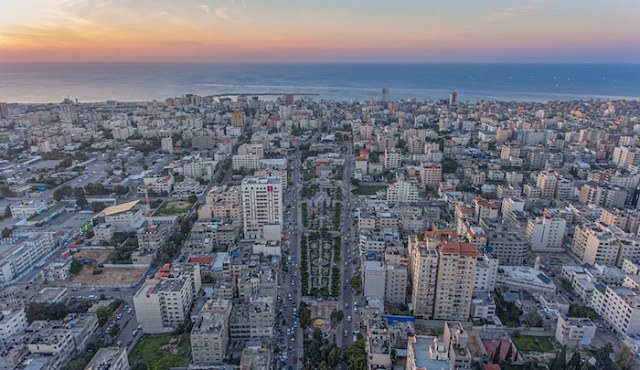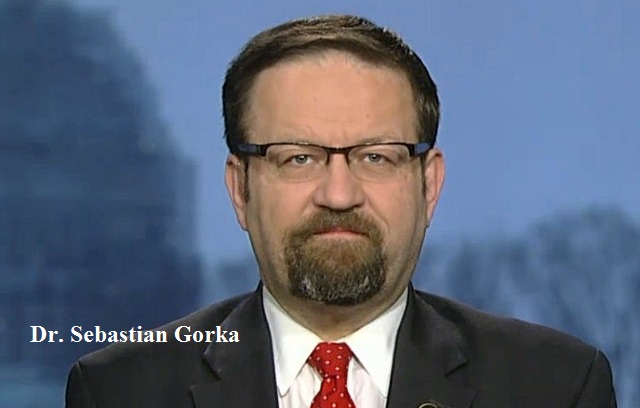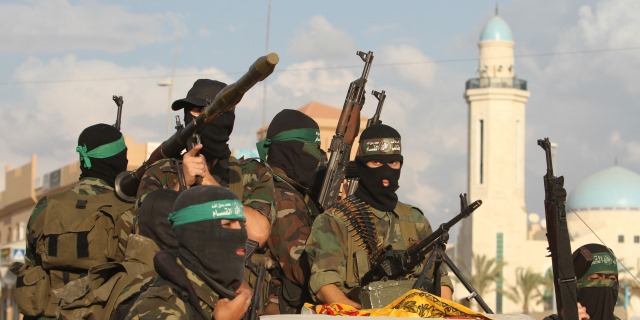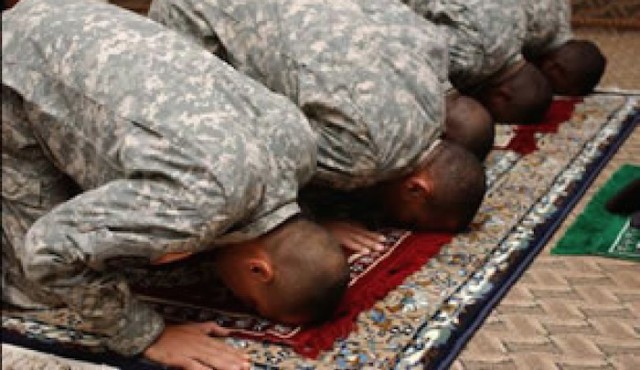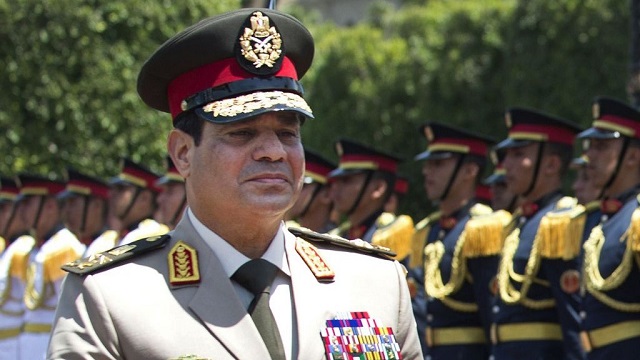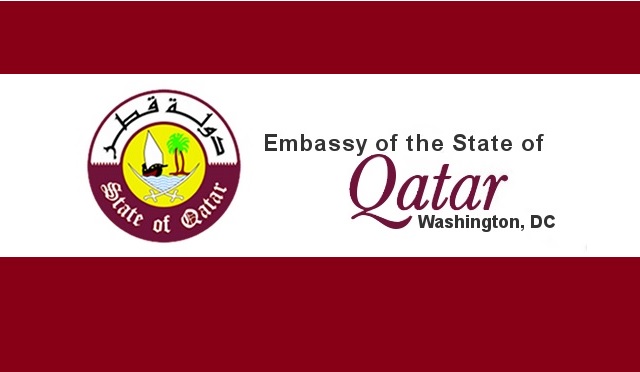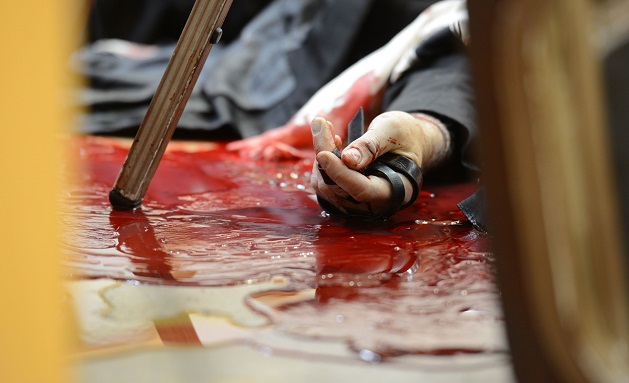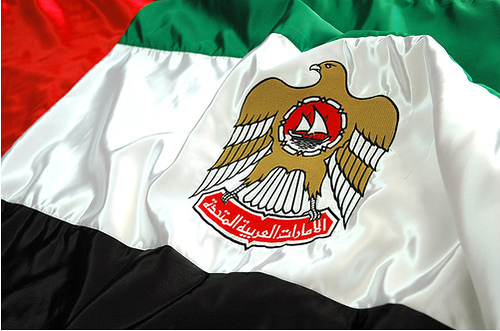Qatar’s Ambassador to Washington H.E. Mohammed Jaham Al-Kuwari is a veteran diplomat with 32 years of service to the small gas rich wealthy Arab state on a peninsula jutting into the Persian Gulf off Saudi Arabia. American educated at the University of Portland, Oregon with graduate work at the University of Madrid in Spain, he speaks several languages including Farsi used during a diplomatic post in Tehran. He has held a number of diplomatic posts, Foreign Ministry and Cabinet positions. As Qatar’s Ambassador Extraordinary and Plenipotentiary, he presented his credentials to President Obama in the Oval Office in March 2014. Ambassador Al-Kuwari spoke Friday, December 5th at the monthly meeting of the Tiger Bay Club in Pensacola, Florida.
Qatar with its capital of Doha has fewer subjects than the metropolitan Pensacola area, approximately 300,000. There are also upwards of 1.7 million foreign workers residing in Qatar with some evidence of human rights violations. Human Rights Watch in its 2014 World Report noted:
Migrants continue to experience serious rights violations, including forced labor and arbitrary restrictions on the right to leave Qatar, which expose them to exploitation and abuse by employers.
The soft spoken Qatari diplomatic representative flew in from “wintry DC” the prior evening to be greeted by Pensacola Mayor Ashton Hayward, Escambia County Commissioner Michael Underwood and the board of the Tiger Bay Club. He presented a check for $10,000 to Mayor Hayward and proceeded to unroll a charm campaign on this Gulf Coast community in North West Florida with a heavy military presence. Located in Northwest Florida are the famed Pensacola Naval Air Station, Navy Training and Information Dominance Commands, the Naval Flight Training Center at Whiting Field, the USAF Air Force Special Operation Command Headquarters at Hurlburt Field, Eglin and Tyndall Air bases. It is not uncommon to see personnel from the six Arab States, members of the Gulf Cooperation Council, undergoing training at these facilities. One of the Tiger Bay board members who attended the private dinner Thursday evening opined the Ambassador gave a “smooth performance.”
The Qatar Charm Campaign
Tiny Qatar across from Shiite Iran is endeavoring to explain the presence of the leaders from terror groups Hamas and Taliban ensconced in luxury in Doha. There are also allegations by the US Treasury that some Qatar individuals and charities may have funded these groups, as well as, the self declared Islamic State, formerly ISIS. A bit ironic, as Ambassador Al-Kuwari said ISIS is a threat to them that needs to be addressed through immediate military action.
On the diplomatic side, Qatar is one of two Gulf Arab States, the other being Oman, that have diplomatic relationships with America’s ally in the Middle East, Israel. He stressed their recognition of the State of Israel which has offices in Doha. He spoke about the role of Qatar trying to bring about peace between the Jewish State and the Palestinians, what he repeatedly deemed as the principal root cause of unrest and violence in the region. He spoke about the criticism from fellow Arab League members questioning why Qatar tolerates Israeli presence and Jewish visitors.
Ambassador Al Kuwari propounded the view that the Al Jazeera satellite TV network was founded as the “voice of the Arab Spring”, promoting democratic aspirations. He pointed out Qatar’s own aspirations to build democratic institutions noting a possible future elected parliament, given the two century rule by the Al-Thani family.
“Qatar doesn’t support Hamas”
He astounded some in the audience when he claimed that Qatar does not support Hamas. This despite the $1 billion pledge by Qatar made at a Cairo conference to underwrite one quarter of the $4 billion cost to rebuild Gaza after the third Hamas perpetrated war with Israel since 2008. In his Tiger Bay talk he referenced the 2,200 Gazans killed in IDF Operation Protective Edge, not mentioning that the majority were Hamas and Palestinian Islamic jihad operatives who had used civilians as human shields. Nor did he mention that the $400 millions pledged after the 2012 Gaza war may have been used to build the terror tunnels that enabled cross border attacks inside Israel during the recent summer war. As he put it, “better to have Khaled Meshaal, the leader in Qatar than across the Gulf in Iran”.
As to questions concerning permitting a Taliban office in Qatar, the Ambassador said that was to facilitate discussions with the Afghan government leading to an inclusive democratic government. He recommended the terror group relinquish its threats of violence and denial of empowerment of women through education. He noted the role played by Qatar in release of several Taliban leaders from detention in Guantanamo in exchange for release of captive US Army Sergeant Bergdahl. However he did not respond to questions as to whether any of the released Taliban commanders in Qatar were rumored to have subsequently joined ISIS.
When asked about the Muslim Brotherhood, he suggested that there could be democratically elected Islamist governments, decrying the imprisonment by Egyptian President el-Sisi of Brothers, liberals and human rights advocates by the newly elected government. The Ambassador suggested that the Muslim Brotherhood may not have resorted to terrorism, which appears contradicted by Egyptian, Saudi and UAE designations. He was, however, silent about the long term presence in Qatar of exiled Egyptian Muslim Brotherhood preacher, Yusuf al-Qaradawi founder of the Union of Good, a US Treasury Global Designated Terror Group supplying Hamas.
As Ambassador Al-Kuwari was finishing his presentation The Investigative Project was reporting:
Interpol issued a bulletin Friday seeking the arrest of the Muslim Brotherhood’s most influential cleric Yusuf al-Qaradawi. The bulletin was sparse on details but said that Egypt wanted the 88-year-old Qaradawi “to serve a sentence” for crimes including “incitement and assistance to commit intentional murder.” … According to the Global Muslim Brotherhood Daily Watch, Interpol issued a “red notice” which is both its highest level alert, and a move subject to later review by the international police agency.
The Egyptian El-Sisi government had requested extradition by Qatar of al-Qaradawi to stand trial.
Ambassador Al-Kuwari painted a glowing picture of Qatar as the Switzerland of the Middle East with billions of dollars holding hundreds of international academic, business and interfaith conferences akin to Davos. He touted American universities like Cornell, Northwestern, Texas, and Virginia Commonwealth that set up programs in Doha. He said that Qatar wanted to invest in economic enterprises in the region to create jobs for the large number of unemployed university graduates. In the US Qatar is spending $5 million funding university courses to teach Arabic.
He emphasized the humanitarian contributions of Qatar reflected in the $100 million given for the rebuilding of New Orleans following hurricane Katrina, the $850 million to rebuild Haiti after the 2012 Earthquake in cooperation with the Clinton Foundation and a major push against Polio in the less developed world in conjunction with the Gates Foundation. But there were also investments in the US, like the $1.5 billion City Center complex developed with the Hines group in Texas revitalizing a derelict section of Washington, DC.
When asked about the depiction of Islam as being prone to violence reflected in the barbarism of ISIS, he deplored that. He contended that ISIS and Al Qaeda affiliates were a distinct minority that had infiltrated the demonstrated record of tolerance of Islam. His message was that Qatar was following the example of the 800 year Muslim reign in Al Andaluz, southern Spain, where allegedly Jews, Christian and Muslims lived in tolerance. This is not demonstrated by the history of intolerance and barbarism akin to that perpetrated by contemporary ISIS and the Taliban during the successive waves of invasion by extremist Berber-Muslims from North Africa. He noted Qatar’s approval for building a new Catholic church.
Is Qatar a Frenemy?
Seasoned observers of the Middle East Region say that Qatar under the two century rule by the Al-Thani family “has been punching internationally above its weight class” to use the boxing analogy. Yet Qatar has often been referred to as a Frenemy. Not exactly a friend, not exactly an enemy.
On the friend side Qatar has assisted in building several major bases including the forward command center at al-Udeid air base for the US Central Command, headquartered at MacDill Air Base just outside Tampa, Florida. Qatar has supplied air contingents in the US-led coalition of 60 countries seeking to “degrade and destroy” Sunni extremist group, the Islamic State, formerly ISIS. The capital, Doha has been turned into an international education hub for the Middle East with the aid of US academic institutions and think tanks like the Doha Center of the Washington, DC –based Brookings Institution. Qatar has created jobs here in the US by purchasing $19 billion of 50 Boeing 777s for expansion of its Qatar Airways in major hubs Dallas, Miami , Philadelphia to bolster existing facilities in Houston, Washington, DC, New York and Chicago . Further, Qatar has signed agreements with the Pentagon to purchase more than $11 billion in Patriot Missiles, Apache helicopters and Javelin anti-tank missiles. Moreover, it acquired the Current TV channel, now Al Jazeera America, from former Vice President Al Gore and investors.
On the other hand, there is a troubling story. Qatar in a New York Times op-ed by Israeli Ambassador to the UN Ron Prosor called Qatar a “Club Med for Terrorists”. He was referring to providing sanctuary for Khaled Meshaal, the billionaire leader of Hamas. Dr. Jonathan Schanzer of the Washington, DC-based Foundation for Defense of Democracies in testimony before the Joint Subcommittee on Foreign Affairs on September 9, 2014 said “that Qatar is currently Hamas’ ATM”:
“If you add up the annual $400 million that we believe has been pledged by the Qataris and perhaps the rumored $300 million provided by the Turks, then you’re looking at $700 million out of a roughly $1 billion budget,” Schanzer told members of Congress. “I’m no math major, but that would be 70 percent.
Earlier this year three Arab states of the Gulf Cooperation Council, Bahrain, the UAE and Saudi Arabia, briefly withdrew their Ambassadors from Qatar. They were, among other reasons, objecting to the Qatar funded Al Jazeera satellite TV network broadcasting across the region in Arabic the extremist inflammatory statements of exiled Egyptian Muslim Brotherhood preacher, Yusuf al Qaradawi. In November 2014, the UAE joined Saudi Arabia placing the Muslim Brotherhood on its list of world terrorist organizations, including Hamas and, here in the US, Muslim Brotherhood affiliates, the Council of American Islamic Relations and Muslim American Society.
There are questions about what Qatar is doing concerning wealthy Qataris who have funded Al Qaeda affiliate Jabhat al-Nusrah and the Sunni fundamentalist Islamic State in both Syria and Iraq.
There have been accusations that some of the $220 billion funds for the infrastructure in preparation for 2022 FIFA World Cup competition may have involved bribes to FIFA officials and possible diversion of contractor payments to fund the Jihad of the Islamic State.
Some Members of Congress have called for black listing both Qatar and Turkey because of these individuals’ contributions to ISIS, even suggesting that the U.S. move CENTCOMM bases in Qatar elsewhere in the region. Those accusations led the US State Department while calling the current relationship with Qatar “productive”, to also state that “disruption of terrorist financing by Qatari individuals and charitable associations remains inconsistent”.
Conclusion
Qatari Ambassador Al-Kuwari’s Pensacola presentation will doubtless be repeated frequently during his Washington, DC posting. After all the campaign is laced with prospects of American communities and businesses receiving billions in economic rewards. If Qatar is to succeed it might wisely follow the path of fellow Gulf Cooperation Council member Kuwait and rein in terrorist financiers in the tiny state. Qatar might start by honoring the Interpol Red Tag warrant for the arrest and extradition of Muslim Brotherhood preacher Al Qaradawi. As to fostering peace between Israel and the Palestinians, if Qatar’s track record negotiating cease fire proposals with Turkey on behalf of Hamas in the recent summer Gaza war is any indication, that is an unlikely prospect.
Listen to the Qatar Ambassador’s Pensacola Tiger Bay Club presentation.
EDITORS NOTE: This column originally appeared in the New English Review.
